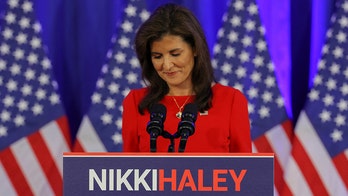WASHINGTON -- As first lady, senator and then Democratic candidate for president, Hillary Clinton was vocal in her fight for the rights of women in Afghanistan.
But, as President Obama's secretary of state, Clinton now finds herself in the uncomfortable position of watching as the U.S.-backed Afghan president signs a law that critics say gives Shiite men the right to rape their wives.
International criticism pressure forced President Hamid Karzai to say Saturday that the law is under review, and he has spoken to Clinton about it.
The developments come as Obama seeks NATO support in Europe for his plan to ramp up the war against terrorists in Afghanistan. Back at home in Washington, administration officials have struggled this week with how to respond to Karzai's signing of the so-called Shia Family Law without debate in the Afghan parliament. The law's most controversial provisions address sexual intercourse in marriage.
"As long as the husband is not traveling, he has the right to have sexual intercourse with his wife every fourth night," Article 132 of the law says. "Unless the wife is ill or has any kind of illness that intercourse could aggravate, the wife is bound to give a positive response to the sexual desires of her husband."
Such a law runs contrary to the stated goals of the U.S. mission in Afghanistan -- to pursue human rights and to help liberate women from religious oppression. It is a cause that has been championed by previous administrations, and particularly by previous first ladies.
The details of the law surfaced this week, just days after one of those former first ladies, Clinton, told the International Conference on Afghanistan at The Hague, Netherlands: "Women's rights are a central part of American foreign policy in the Obama administration; they are not marginal; they are not an add-on or an afterthought."
State Department spokesman Robert Wood said Thursday that officials were "reviewing the legislation." He suggested that its legality might be in question.
"We urge President Karzai to review the law's legal status to correct provisions of the law that ... limit or restrict women's rights," Wood said. He added that "President Karzai is well aware of our views with regard to this legislation."
Karzai said Saturday that "measures will be taken," though it is unclear what changes, if any, he has in mind. He said he hadn't seen "any problems" with the law when he previously studied it.
Afghanistan's constitution, which was passed in 2004, calls for equal rights for all men and women. But the constitution also says that no law can contradict the laws of Islam. And in situations where the constitution lacks provisions, courts are allowed to use Islamic law, which critics say does not allow for equal rights.
Reports suggest Karzai pushed through the law on behalf of powerful fundamentalist Shiite leaders, whose support he needs ahead of his country's August elections. The law will affect only Shiites, estimated by various sources to be between 10 and 30 percent of the population. The law will not affect Afghanistan's Sunni majority.
In a written statement, the United Nations Development Fund for Women (UNIFEM), said the law "legalizes the rape of a wife by her husband.... The law violates women's rights and human rights in numerous ways."
The law also has drawn fire from women in the Afghan parliament, as well as groups inside and outside Afghanistan, who say it rolls back the gains they made after the U.S. military ousted the Taliban government in 2002.
"All the efforts that were made in the last seven years to enhance women's rights will be undermined," said Afghan lawmaker Fawzia Kufi.
"This law comes as very little surprise to me. It is literally the price we've paid for dealing with fundamentalists," said Sonali Kolhatkar, who co-directs the Afghan Women's Mission in the U.S.
"In order to build a robust civil society in Afghanistan we need to push and pull the Afghans on basic human rights," said Ann Marlowe, an American author who has reported frequently from Afghanistan. She has said Karzai is not "at heart a supporter of women's rights."
Seven years into the war in Afghanistan, the Taliban is clinging to power in swaths of the country and in neighboring Pakistan, and Obama administration officials acknowledge that women are still struggling against violence, illiteracy and poverty. But many believe the U.S. will have to negotiate with Islamist warlords -- or perhaps even the Taliban -- to achieve political or military success.
"The contradiction between political rhetoric and policy reality has often been the American way," columnist Marie Cocco wrote for RealClearPolitics.com. "But now we have Hillary Rodham Clinton as secretary of state. When she was first lady, she championed the rights of women oppressed by the Taliban long before most Americans had ever heard of that radical regime."
David Isby, the Washington-based author of several books on Afghanistan, says it should be no surprise that Shiite fundamentalist leaders want this new law, and that Karzai, seeking re-election, would grant it. He says there was an inherent conflict in trying to impose Western values on the Muslim nation to begin with. As for negotiating with fundamentalists, he said, "If they talked with only people we approve of, you would have six Afghans to work with."
But critics like Marlowe and Kolhatkar aren't buying it. They say there are plenty of progressive Afghans who are unhappy about the shifting tide but never get a seat at the table. They say the Obama administration must be steadfast in its position that Afghanistan needs to honor human rights.
Said Kolhatkar: "Any real power deals done between the U.S. and these forces, neither option really works for women. Women are constantly being subordinated."
"Certainly it is a wonderful thing to champion women's rights," said Kolhatkar, "but put your money where your mouth is."
The Associated Press and State Department producer Nina Donaghy contributed to this report.




